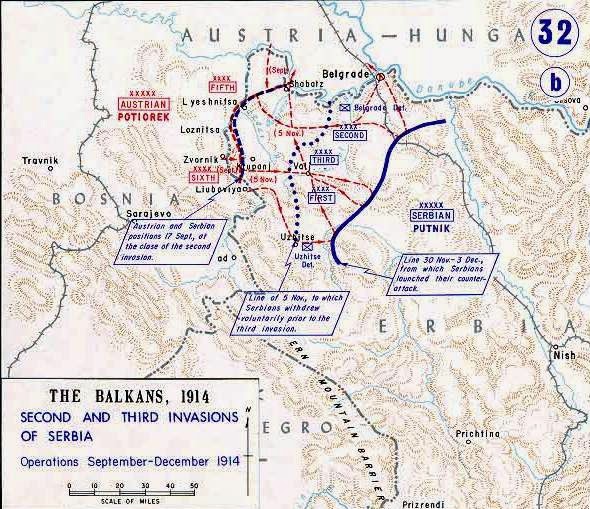One hundred years
ago, in December 1914, Serbian troops counterattacked at the Battle of Kolubara
and drove the Austro-Hungarian army from Serbian territory.
Apart from the
anniversary, my attention was drawn to the battle when I acquired a copy of the
novel ‘A Time of Death’ by Dobrica Cosic. Not easy to get hold of and my copy
came from a US bookseller – it once graced the shelves of Anaheim Public
Library in California.
The novel catches
the confused and desperate nature of the fighting in the mountains of
north-western Serbia. It follows the story of the 1st Army commander
Zivojin Misic and a group of students who are called up to bolster the ranks of
the retreating Serbian army.
The battle started on 16 November, when the
Austro-Hungarians, commanded by Oskar Potiorek, reached the Kolubara River.
They had captured the strategic town of Valjevo and forced the
Serbian Army to retreat. The Serbs abandoned Belgrade on 30 November.
The book focuses on the surprise Serbian counterattack
on 2 December. The Austro-Hungarian forces were extended with weak supply lines
which meant they were unable to take full advantage of their superiority in
artillery. The Serbian retreat had allowed a brief rest for the hard-pressed
troops and supplies of artillery shells and other equipment had arrived.
The Serbs retook Valjevo on 8 December and the
Austro-Hungarians retreated to Belgrade, which had to be abandoned on 15
December. Both armies suffered heavy casualties, with more than 20,000 dead on
each side. However, the defeat humiliated Austria-Hungary and Potiorek was
relieved of his command.
‘A Time of Death’ has been criticised as a nationalist
polemic, largely I suspect due to the author’s later political career. He was
the first President of the rump Yugoslavia (Serbia and Montenegro) in 1992,
riding a wave of Serbian nationalism and was a supporter of the Bosnian Serb
Army during the Bosnian War. Although he later fell out with Milosevic.
In fairness, while the book entirely focuses on
the Serbian forces, it doesn’t spare the command deficiencies of the Serbian
high command. By modern standards of historical fiction this book can be tough
going and could have been more concise. However, it does give a gritty
portrayal of winter warfare in the mountains. It was certainly grim and you can
only admire the endurance of the men involved.
Early war Serbian troops in 28mm from my collection



No comments:
Post a Comment